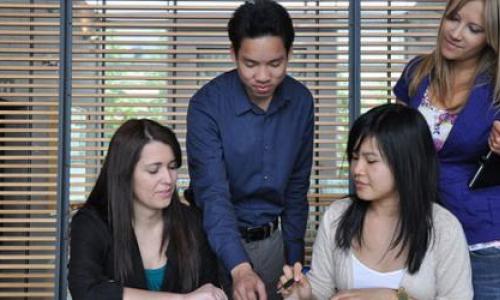
Editor's note: Questions about applying to graduate school? Check out Career Services' event, "The Truths and Myths About Getting Into Grad School" this Thursday, Mar 21! Visit our events page for more info!
Almost every graduate degree, diploma, or professional school application includes a letter (or statement) of intent. Medical school, law school, MBA programs, and nearly all graduate level program applications require a letter of intent. So what is it, and how do you write one?
Ideally, your letter of intent is a place for you to show your passion for the program, the school, and its mission. Most programs ask for a unique letter and may provide certain guidelines, but the goal of all these letters is essentially to help the admissions committee find out whether or not you are suitable for their program. They may ask themselves: is this person interesting? Are they passionate? Are they professional enough to represent our school?
Letters of intent are especially important for programs that do not interview candidates, but rely only on the information that your application and your letter provides. It may be their only chance to get to know more about you!
So, thinking about graduate school? Here are four tips for writing your next letter of intent:
Know the Rules:
Read the instructions carefully: schools have different questions they want answered. If that is the case, they will explicitly provide questions for you to answer in your statement. Plan to adhere closely to the directions they give, such as word or page limits. Follow all guidelines closely! If unsure, call an admissions representative to find out what their preferences are.
Know Yourself:
Ask yourself why you want to be accepted to this program. What about this program entices you the most? Why this school? Why their program, as opposed to others? In other words, what is your intention? Take inventory of your greatest strengths, with examples to support them.
Know the Program:
Once you’ve brainstormed your strengths, relate them back to the program and your career goals. Do some research so you can figure what is important for them and discuss common values. For example, if you are applying to medical school, make sure you address why becoming a doctor is important to you. Similarly, if the program is focused on problem-based learning, you might talk about your past experiences maintaining a relationship with mentors and learning from their critique, experience, or perspective on your work. If a program values research, you might add your strengths or interests in research-related work.
Tell a Story:
To illustrate this point, let’s assume that I’m applying to SFU’s Masters in Public Health (MPH) program, offered by the Faculty of Health Sciences. A careful survey of their admissions webpage reveals that MPH at SFU is the only fully accredited program of its kind in Canada, and that it has several specialization streams. If I were interested in global health, then my statement of intent would ideally tell a story about what makes me a health enthusiast, and why global health matters to me. Since the admissions process for this program doesn’t include an interview, this is my one time chance to show them something about my personality, my contribution to the world, and my commitment to the health of all people around me.
A well-articulated and persuasive personal statement might convince an admissions committee to look more closely at a candidate with a lower GPA. If the letter clearly reflects how an applicant is a better fit for the program than those with more competitive GPAs, how couldn’t they?
Finally, here’s a list of do’s and don’ts that you may find helpful.
|
Do |
Don’t |
|
Write of an event in your life that you learned form and that helped shape your career goals |
Write a cliché introduction and/ or conclusion |
|
Include short-term & long-term goals, where applicable |
Put monetary benefits from the profession as your primary motivation for the program |
|
Relay your life experiences to your career motivation, goals, or as a reason for any inadequacies or gaps in your academic performance |
Write in a manner that might feel like you are asking for pity. |
|
Point out some of your major achievements in the field of study |
Re-write your resume or CV. Avoid redundancy altogether. |
|
Use formal language, and support all your arguments and points |
Leave any grammatical errors in your work |
|
When disclosing any personal information, be mindful of how it may add to or take away from your perceived suitability to the program. |
Talk about everything if you are including weaknesses or traits that might go against your application |
|
Proofread & revise your work, making sure that it flows and has an introduction that draws the reader in and forces them to keep reading. |
Discuss potentially controversial topics or research findings. |
This should go without saying, but never plagiarize others’ work! If you’re caught, the consequences can be harsh (and your chances of being admitted will be jeopardized).
Feel free to come see us at Career Services for help on your personal statements!
Beyond the Blog
You can also check out the following articles:















